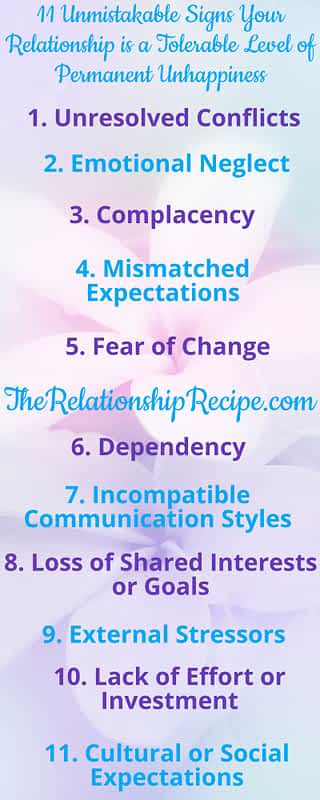11 Unmistakable Signs Your Relationship is a Tolerable Level of Permanent Unhappiness
You didn’t sign up for “unhappily ever after,” but here you are – stuck in a relationship that’s just miserable enough to stay in, but not quite bad enough to leave. That’s what a tolerable level of permanent unhappiness looks like. Putting up with a bad relationship is just a steady steam of dissatisfaction humming under date nights, chores, and awkward silences.
You don’t have to be British to master the art of grinning through a quietly unhappy relationship – most of us are pros at putting up with a bad relationship and calling it love, or worse, “just how relationships are.”
But that low-level relationship misery, the slow emotional leak… that’s not normal, and it’s not sustainable. So let’s break down how you end up here, why so many people quietly settle, and what you can do when your tolerance of relationship unhappiness becomes your emotional baseline.
💡Key Highlights
- How to spot when your relationship has quietly settled into “just enough” unhappiness.
- Why settling for emotional numbness is more common and risky than you think.
- The surprising reasons you might be tolerating more misery than you realize.
- What happens when fear and comfort keep you stuck in an unhappy partnership.
- Practical moves you can make to break free from the slow burn of relationship dissatisfaction.

What a Tolerable Level of Permanent Unhappiness Looks Like in a Relationship
When your relationship hits that tolerable level of permanent unhappiness, you’re not screaming at each other, but you’re also not laughing, connecting, or feeling much of anything. You’ve both quietly agreed (without ever saying it out loud) that this is just… fine. Not good, not awful. Just fine. A numb, feeling of flatness.
The reason you stay is because the misery doesn’t scream loud enough to shake things up. It’s a low-level relationship misery that nags, drains, and dulls you down. But hey, it’s not technically terrible, right?
So you keep going, putting up with a bad relationship, because walking away feels harder than living with the ache. Even if deep down, you know that kind of emotional limbo chips away at your spirit one silent dinner at a time.

This kind of low-level relationship misery doesn’t always look miserable on the outside; it just slowly erodes from the inside out. It shows up in sneaky, soul-sucking ways:
🚩1. Emotional Disconnection
You’re not fighting, but you’re not really talking either. Somewhere along the way, the deep conversations turned into logistics. You’ve stopped sharing your inner world, and now the relationship feels more like a roommate arrangement than love. You’re still together, but love stopped being the reason a while ago.
🚩2. Low Conflict, Low Satisfaction
There’s no major drama – just a whole lot of nothing. No spark, no joy, no fights worth remembering. It’s like living in emotional beige. This kind of low-level relationship misery is deceiving because it’s quiet. But quiet doesn’t mean healthy, it means you’re stuck in a rut so deep you’ve stopped noticing the walls.
🚩3. Fear of Change
Believe me, I get it – leaving is terrifying. Whether it’s the kids, the mortgage, or the idea of dating again, the fear of change makes staying feel safer. So you put your head down and keep going, putting up with a bad relationship because at least it’s predictable. Miserable, but predictable.
🚩4. Loss of Identity
At some point, you stopped being “you” and just became half of “us.” Now, the idea of starting over feels like trying to build a new life from scratch—and you’re not even sure what that would look like anymore. So you stay in low-level relationship misery. Not because you’re happy, but because you can’t picture yourself alone.
🚩5. Compromise That Turned Into Giving Up
Compromise is healthy until it becomes surrender. You used to hope things would get better. Now, you just hope to make it through the week without another disappointment. That slow shift from trying to fix things to silently enduring them is how tolerance of relationship unhappiness becomes your new normal.
When you add it all up, you’re left with a relationship that’s running on autopilot. It’s not falling apart, but it’s definitely not thriving. This dull, gray middle ground is where unhappily ever after begins to take root. And the longer you stay in it, the harder it gets to tell the difference between peace and resignation.

How Does a Relationship Get to Unhappily Ever After?
A relationship doesn’t just magically settle into a tolerable level of permanent unhappiness; it usually slides in slowly, thanks to a mess of issues that build up over time. Here are a few of the usual suspects:
1. Unresolved Conflicts
You think avoiding arguments keeps the peace. What it actually does is shove problems into emotional storage until they rot. Every time you dodge a real conversation or let something slide “to keep things calm,” you’re not solving anything. You’re just stacking silent resentments like emotional Jenga. Eventually, that tower’s going to fall, and guess what you’ll be left with? A quietly unhappy relationship where both of you feel ignored and fed up.
2. Emotional Neglect
Sure, you text each other about groceries, but when’s the last time you actually checked in on each other’s mental state? When emotional needs get pushed aside for work, chores, or scrolling in separate rooms, loneliness creeps in, even when you’re sitting right next to each other. This is how tolerance of relationship unhappiness sneaks into the picture: not through big betrayals, but through daily indifference.

3. Complacency
At some point, the spark fades and you’re just two people sharing a couch and a Netflix account. The date nights stop, the compliments vanish, and effort becomes optional. This kind of autopilot living is a slow death for connection. You stop trying, they stop trying, and before you know it, you’re neck-deep in low-level relationship misery, wondering how you went from passion to passively coexisting.
4. Mismatched Expectations
One of you wants kids, the other wants freedom. One wants intimacy, the other wants space. You assumed you’d figure it out later, but “later” became years of passive-aggressive silences and circular half-arguments that go nowhere. When you never align on the big stuff, the friction never fully goes away. Over time, those unmet needs start eating away at your closeness, turning every difference into a quiet little wedge. That’s how you end up putting up with a bad relationship instead of thriving in a real one.
5. Fear of Change
This one’s a classic. You’re unhappy – but is it worth blowing up your entire life? Splitting assets, managing the kids, dealing with everyone’s opinions? It’s tempting to just sit tight and deal with the devil you know. But that’s how you fall into a long-term relationship that feels more like a life sentence than a partnership. That deep tolerance of relationship unhappiness comes from convincing yourself that discomfort is easier than disruption.

6. Dependency
Sometimes it’s not love; it’s logistics. One of you handles the bills, the other handles the emotional labor, and neither of you feels free. Whether it’s emotional, financial, or practical dependency, it creates a power imbalance that keeps people stuck. You might not want to be there, but you don’t feel like you can leave. That’s how a quietly unhappy relationship stays intact, because breaking free feels harder than enduring the daily drag.
7. Incompatible Communication Styles
You talk. They listen. Or maybe they talk, and you shut down. Either way, it’s like shouting into a void. When your communication styles constantly clash, or worse, one of you just gives up trying – the gap only gets wider. You stop feeling heard. They stop feeling understood. And suddenly, you’re both simmering in low-level relationship misery, stuck in the same cycle with zero progress.
8. Loss of Shared Interests or Goals
At some point, you stopped walking the same path, and you’re just awkwardly pacing next to each other. Maybe you grew, and they didn’t. Or you wanted more out of life, and they just wanted to stay put. When you no longer share passions, priorities, or even weekend plans, things start to feel transactional. That’s when never ending low-level relationship misery starts to look like your new reality, and “us” feels more like two solo acts under one roof.

9. External Stressors
Work sucks, bills pile up, someone’s always sick, and suddenly your relationship feels like just one more thing to manage. When life throws nonstop stress at you, it’s easy to put your connection on the back burner. Eventually, the emotional neglect becomes routine, and your relationship slips into survival mode. That’s how you wake up one day in a state of unhappily ever after, wondering when you last actually enjoyed each other’s company.
10. Lack of Effort or Investment
Relationships don’t run on autopilot, but people sure love trying. When one or both of you stops showing up the relationship rusts. No check-ins, no appreciation, no intimacy. Just two people tolerating the status quo because change takes energy, and energy is in short supply. Welcome to low-level relationship misery, where nothing gets better because no one’s even trying anymore.
11. Cultural or Social Expectations
Sometimes you don’t stay for love, you stay because you’re “supposed to.” Maybe your family expects it, maybe your religion demands it, or maybe you just don’t want to be the one who “gave up.” But clinging to a relationship for appearances only guarantees one thing: a long-term, soul-numbing tolerance of relationship unhappiness. It looks good on the outside, but inside, you’re both silently giving up.

Steps to Fight Tolerance of Relationship Unhappiness
If you’re sitting in a relationship that runs on a tolerable level of permanent unhappiness, you don’t have to keep marinating in it. You deserve more than emotional autopilot and dinner conversations that feel like job interviews. It’s time to actually do something, starting with you:
✔️Get Honest With Yourself
Before you start pointing fingers, pause and look inward. What do you actually need from a relationship? What parts of this dynamic are keeping you in low-level relationship misery? This is where you figure out whether you’re facing temporary burnout or if you’ve been putting up with a bad relationship for way too long.
✔️Say the Quiet Part Out Loud
You’ve gotta talk to your partner. Have the uncomfortable, awkward, “I’m not happy and we need to figure this out” conversation. Skip the blame game and lead with how you feel and what you need. If you’ve both been drifting in emotional silence, this might be the first time they’re even hearing it. You can’t fix low-level relationship misery by pretending everything’s fine.
✔️Bring in the Pros
Therapy isn’t only for couples on the brink; it’s for couples who want better than unhappily ever after. A good counselor can help decode the misfires in your communication and get you both back on the same page, or help you realize if it’s time to walk away.
✔️Check Your Expectations
No relationship is magical 24/7. But there’s a big difference between normal rough patches and a soul-crushing status quo. Ask yourself if what you’re expecting is fair, or if you’ve been tolerating relationship unhappiness so long, you’ve forgotten what happy even looks like.
✔️Take Care of You
No matter what your relationship status is, your well-being matters. Start doing things that bring you joy, stretch your mind, or just remind you you’re alive. The stronger and more centered you feel, the less likely you are to accept a life of putting up with a bad relationship.

✔️Strengthen Your Support Squad
You don’t have to carry this alone. Lean on friends, family, or even support groups that get what you’re going through. Sometimes just saying it out loud to someone who cares can cut through the fog of a tolerable level of permanent unhappiness and remind you you’re not trapped.
✔️Take a Hard Look at the Future
What’s this relationship costing you long-term? Your mental health? Your sleep? Your sanity? If the answer isn’t “not much,” then maybe it’s time to rethink what you’re signing up for. Low-level relationship misery isn’t harmless; it piles up and drags you down over time.
✔️Don’t Be Afraid to Explore Other Paths
If you’ve tried everything and still feel stuck in that unhappily ever after relationship rut rut, it’s okay to consider alternatives. Sometimes the best way to heal is to walk away. It’s not a failure – it’s choosing happiness over habit.
✔️Get Smart About the Practical Stuff
If you’re thinking about leaving get your legal and financial ducks in a row first. Knowing your rights and options gives you power (and peace of mind) before you take the plunge.
✔️Invest in Yourself
This is your life. Pursue the things that light you up: new hobbies, learning, career moves. The things that make you feel alive again. When you grow, your relationship options grow too.

Wrapping Up Putting Up With a Bad Relationship
You don’t have to settle for a life where your relationship is “not bad enough to leave.” That middle-ground misery is still unhappiness, no matter how well you hide it. And you don’t need to build your life around a tolerable level of permanent unhappiness just because it’s familiar. You get one life. Don’t spend it sleepwalking through unhappily ever after.
Thank you for reading this post, don't forget to subscribe!







